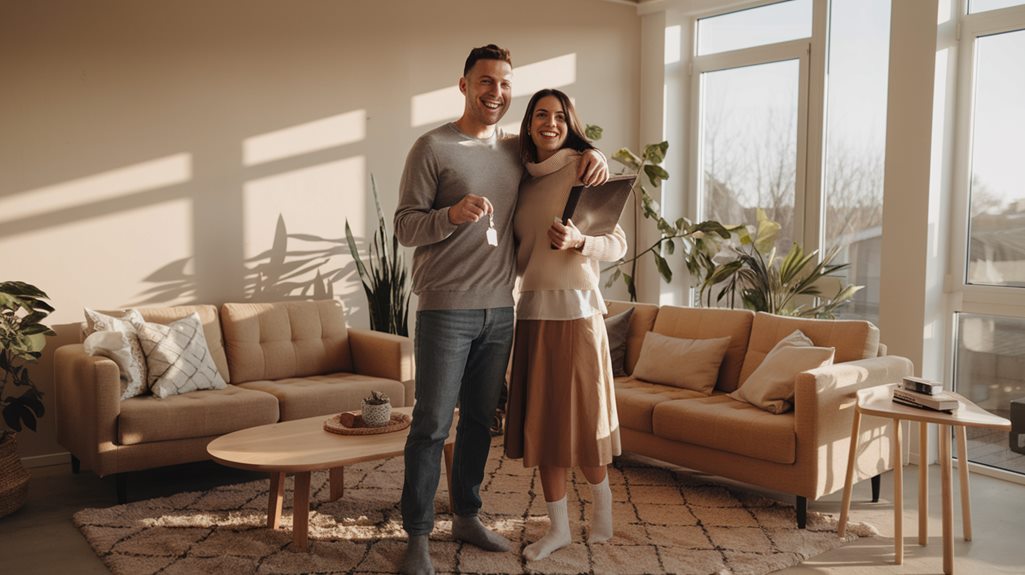Buying your first home is exciting! First, check how much money you have. This helps you know if you are ready to buy. Learn about different types of loans so you can choose the best one for you. Getting pre-approved for a loan shows that you are serious about buying a home.
Next, think about what you need in a home. A real estate agent can help you find a good place. When you find a home you like, make a good offer to the seller. It's also smart to hire someone to check the home for any problems.
After that, get your money ready and get set to close the deal. Make sure everything fits with your goals.
Let's look at some ways to make buying a home easy and fun!
Ready to start building equity in your own Michigan home? Get your personalized home loan quote today.
Assess Your Financial Health

Before you start looking for a new home, it's really important to check how you're doing with your money. First, take a good look at any money you owe. Try to pay off loans that cost you a lot of interest. These can make it harder for you to buy a house.
Next, think about saving money. It's a good idea to have some extra money saved up for emergencies, just in case something surprising happens. At the same time, save up for a down payment on your new home. Doing both of these will help you feel more secure with your money and show sellers that you're a serious buyer.
Remember, banks and lenders like to see that you handle your money well. When you manage your debts and save smartly, you'll feel more confident and ready to join the home-buying world.
Michigan residents, unlock the door to your new home. Request your home loan quote from Treeside Financial today.
Understand Mortgage Options
When you buy your first home, it's really important to understand your mortgage options.
Take your time to look at interest rates closely. Even a tiny change can save you a lot of money over the years.
Think about fixed loans and adjustable loans. Choose the one that fits your money goals and comfort level with risk.
This way, you can make a smart choice!
Compare Interest Rates
Finding the right mortgage can feel a bit scary, but it's really important to know your choices.
Start by looking at how interest rates change. These changes can help you pick the best time to lock in a rate, which could save you a lot of money later.
Don't just take the first offer you see. Check out different lenders because they might give you different rates, even for the same type of loan.
By comparing these rates, you can ask for better deals and feel good about your choice.
Fixed vs. Adjustable Loans
After you look at interest rates from different lenders, it's time to think about the types of mortgages you can get. You can choose between fixed loans and adjustable loans.
With a fixed loan, your payments stay the same every month. This is good for planning because you know exactly how much to pay. If you like things to be predictable and don't want surprises, this is a great choice for you.
Adjustable loans can start with lower payments, which might help your budget at first. But, be careful! The payments can change later, depending on the market. This option could work for you if you like to keep an eye on market trends and might think about changing loans later.
Think about what fits best with your money goals and how you live.
Get Pre-Approved

Getting a pre-approval for a mortgage is an important step when you want to buy a home. It shows sellers that you are serious and ready to buy. Having a pre-approval also helps you know how much money you can spend, so you can look for homes that fit your budget. To get pre-approved, you will need to provide some documents like proof of your income, your credit history, and statements about your assets.
| Why Pre-Approval is Good | What You Need to Provide | How it Helps You Buy |
|---|---|---|
| Shows you are serious | Proof of income | Helps you negotiate |
| Helps you know your budget | Credit history | Gives you confidence |
| Makes the process faster | Asset statements | Gives you more choices |
Define Your Home Needs
Now that you have a pre-approval, it's time to think about what you really want in your new home.
First, think about how you live. Do you like being in a busy city, or do you prefer a quiet neighborhood? Make a list of what's most important to you.
For example, do you need to be close to your job, schools, or parks? Think about how many bedrooms and bathrooms you need. If you love to cook, a big kitchen might be on your list.
Remember, your home is more than just a place to live; it's where you'll make happy memories with family and friends.
Look for features that will help you feel comfortable and happy for a long time. By knowing what you need, you'll find a home that feels just right for you.
Hire a Real Estate Agent

Buying a home can feel really tricky and confusing. That's why it's super helpful to have a good real estate agent by your side. A good agent knows a lot about the housing market and can help you find the right home for you.
When looking for an agent, check if they've the right training, know the local area well, and have helped others buy homes successfully.
Having the right agent is like having a buddy who helps you with everything—like talking to sellers, filling out important papers, and understanding what's happening in the market. They make sure you feel good about your choices.
Start House Hunting
Starting your house hunting adventure is exciting!
First, think about how much money you can spend. This will help you look at homes that fit your budget.
Next, check out different neighborhoods. Each one has its own special things to offer, like parks or shops.
Going to open houses is super important, too! You can see the homes up close and learn more about them. This will help you make smart choices when picking your new home.
Happy house hunting!
Determine Budget Limits
Before you start looking for a house, it's important to set a budget. This helps you stay safe with your money and feel good about your choices.
First, think about how much money you can put down to buy a home. This can change how much your monthly payments will be.
You can use simple budget calculators to see what you can afford. These tools help you understand your money better and make sure you choose something you can pay for in the long run.
When you have a good budget plan, you can feel confident as you look for a home. You won't just be buying a house; you'll be finding a place where you feel like you belong.
Always remember, a clear budget is the first step to being a happy homeowner.
Explore Neighborhood Options
After you decide how much money you can spend, it's time to explore neighborhoods. This is a fun part of buying a home! Finding the right neighborhood is important because it's about finding a place where you feel at home.
Here are some things to think about:
- Community spaces: Look for parks, shops, and places to play. These can make your daily life better and help you meet people.
- Schools: Good schools are important, even if you don't have kids. They often mean the neighborhood is a nice place to live.
- Safety: Check how safe the area is. You want to feel safe in your new home.
- Getting around: See how close you're to buses and roads. This can help you get to work or school easily.
Explore with an open heart. Imagine your life in a neighborhood where you'll make great friends and feel happy!
Attend Open Houses
If you're looking for a new home, going to open houses is a great first step!
It's your chance to see houses in person, not just online pictures. You can walk around and imagine what it would be like to live there. You can check out the rooms and feel the neighborhood's vibe.
Open houses are also a good way to meet people. You can talk to real estate agents and even meet your future neighbors! They can share important tips and tell you about the area.
Remember, when you buy a house, you're also joining a community.
Make an Offer

Making an offer on a home is an important step that needs some thought and care. To feel good about your offer, use smart ways to negotiate based on what the market is like and what you can afford.
Here are some easy tips to help you:
- Learn About the Market: Look at what other homes are selling for in your area. This will help you make a good offer.
- Show What You Have: Let the sellers know you're ready to buy. Having a pre-approval letter can make them feel more comfortable.
- Make Smart Conditions: Protect yourself by adding rules about financing and home value in your offer.
- Talk and Connect: Try to build a good relationship with the sellers. When they trust you, it can help your offer stand out.
Using these tips can make this big step easier for you.
Conduct a Home Inspection
Before you buy a house, it's really important to have a home inspection. This check helps find any hidden problems that could cost you money later. Use a home inspection checklist so you don't miss anything, like how strong the house is or if the plumbing and electrical systems work well.
Remember, this isn't just a box to tick off; it's a chance to protect yourself and your investment. If the inspector finds issues, you can talk to the seller about fixing them. This can save you a lot of money and headaches in the future. A good inspector will help you understand what's really going on with the house.
Make sure to take this step seriously. It helps you feel good about your choice and lets you move forward with confidence. Think of it as a way to become a smart and responsible homeowner in your new community.
Secure Your Financing

Getting money to buy a home is really important. It's a big step, and you want to do it right. First, check your credit score. It helps you know what kind of loan you can get and what the interest rates will be. A good score means better deals for you!
Next, get your financial papers ready. Lenders will need these to say yes to your loan. Here are some things to think about:
- Make a budget: Look at your money to see how much you can spend each month.
- Save for a down payment: This is the money you pay at the start. Saving will help you pay less in the long run.
- Pick the right lender: Find a lender that fits your money goals and gives you good rates.
- Know your loan options: There are different loans, like fixed-rate or adjustable-rate. See which one works best for you.
Doing these things will help you buy your home and feel good about being part of a community!
Close the Deal
You're so close to getting your dream home! Just a few more steps to go!
It's really important to know how to negotiate. Look at the market trends and use them to help you. When you research other homes that have sold, you can make sure you get a good deal. Talking clearly with the seller can save you a lot of money.
Work with your real estate agent and lender to get all the paperwork done quickly. Make sure everything is ready, like the inspection results and loan approval.
When it's time to close the deal, pay attention to every little detail. Look over all the documents carefully, and feel free to ask questions. This hard work will help you protect your investment and welcome you to a great new community!







